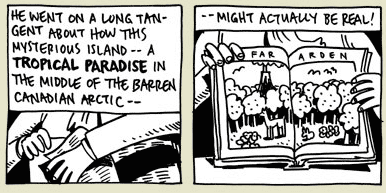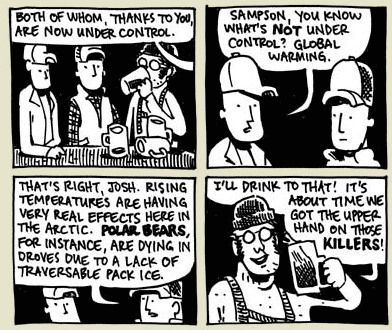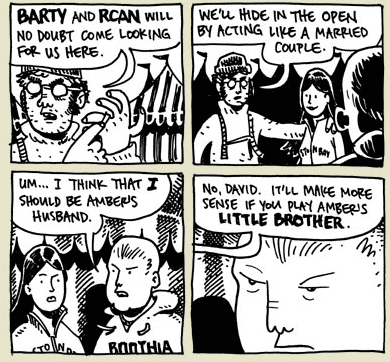Far Arden
How does one talk about a book in which its epilogue either makes or breaks the book for, oh, say: 100% of its readers? Give in and spoil the ending by talking about it or politely ignore what may be the most important thing to talk about for potential readers? Tough questions.
Luckily you have me.
Far Arden is one of the best comics I've read in a while. Comedies are ridiculously difficult to pull off over the long haul. Generally, their shtick gets a little long in the tooth well before the halfway mark and the same would have held true for Far Arden had it not gradually developed into a compelling story with decently well-realized characters.
Following Army Shanks, a man "as cold and unforgiving as the Arctic herself," author Kevin Cannon treats the reader to a bizarre journey through arctic locales and jaw-dropping onomatopoeia. Shanks makes his way through fishing villages, queer universities, and frozen islands (which apparently actually exist in that nefarious and frigid land known as Canada) along with an entourage of friends, enemies, and former friends and enemies. All to the end of finding Far Arden, the mythical island whose discovery has devoured the lives of almost every principle character in Cannon's book.

Throughout the book Cannon skirts the border of believability, never quite falling into a world that jibes with reality, but never going so far into fantasy that we don't understand there are certain mortal rules common to both our reality and his. Relationships tack as they do in our world, those mauled by polar bears don't get up, and ambition can kill. That said, there are golden narwhals that will direct willing sailors to paradise. So you've got that going for you.
And then there's the humor.

Despite the fact that Far Arden offers a compelling (?) cautionary tale of broken promises and unrelenting ambitions, Cannon makes certain that the driving force of the book is its sense of the humourous. Nearly every page holds something amusing, especially moments catering to those of absurdest sensibilities. Cannon's use of inventive onomatopoeia alone makes Far Arden something worth picking up—even if you don't end up liking the ending.
So yeah, the ending. It might make you mad or it might just make you furious. Or maybe it will confuse you. Or maybe, after a moment's thought, you might just find that you actually liked the ending and that Cannon prepared you for it more than you thought. Or maybe you'll read it and think, Huh! and then remember that part with the polar bear and the man-sized bite and promptly forget that there was even an ending at all.
On whichever side of the apparently controversial finale you find yourself, I think most everyone should be able to sit back and think: yes, that book was worth my time. If they like, they can even pretend the epilogue didn't exist!
For those curious about the sloppy-ish art style of the book, Kevin Cannon apparently began the book as part of an extreme 24-hour comic experiment—instead of creating a whole 24-page comic in a single 24-hour sitting, he would perform a year's worth of these sittings to create a single, large book. That lasted for four months, so each of the first four chapters were created in a discreet 24-hour period. After that, he adopted the same style but slowed down his pace to one chapter per month—though not in a single sitting. (I believe the additional time spent shows.)
Far Arden can be read in its entirety (and for free) online at Cannon's own website!
p.s. In Which I Spoil Things (hover to read easily)
I actually appreciated the book's conclusion, even if it initially caught me off-guard. I thought Cannon was saying starkly what he had been saying obliquely throughout the prior 368 pages.
From the outset, we discover that Far Arden destroys lives. At first by the possibility of its existence, then by the certainty of its existence, and finally by the experience of its existence. The end is foreshadowed by much more than Fortuna's quotation of Lawrence Oates and the book's gathering darkness shows a steady increase as it goes: deaths are first played for laughs with characters we don't know (Flue), then move into heroism (Anger), then to tragedy (Amber), and finally to meaninglessness.
I wanted a different ending, but I appreciated the ending I got.

Good Ok Bad features reviews of comics, graphic novels, manga, et cetera using a rare and auspicious three-star rating system. Point systems are notoriously fiddly, so here it's been pared down to three simple possibilities:
3 Stars = Good
2 Stars = Ok
1 Star = Bad
I am Seth T. Hahne and these are my reviews.
Browse Reviews By
Other Features
- Best Books of the Year:
- Top 50 of 2024
- Top 50 of 2023
- Top 100 of 2020-22
- Top 75 of 2019
- Top 50 of 2018
- Top 75 of 2017
- Top 75 of 2016
- Top 75 of 2015
- Top 75 of 2014
- Top 35 of 2013
- Top 25 of 2012
- Top 10 of 2011
- Popular Sections:
- All-Time Top 500
- All the Boardgames I've Played
- All the Anime Series I've Seen
- All the Animated Films I've Seen
- Top 75 by Female Creators
- Kids Recommendations
- What I Read: A Reading Log
- Other Features:
- Bookclub Study Guides










